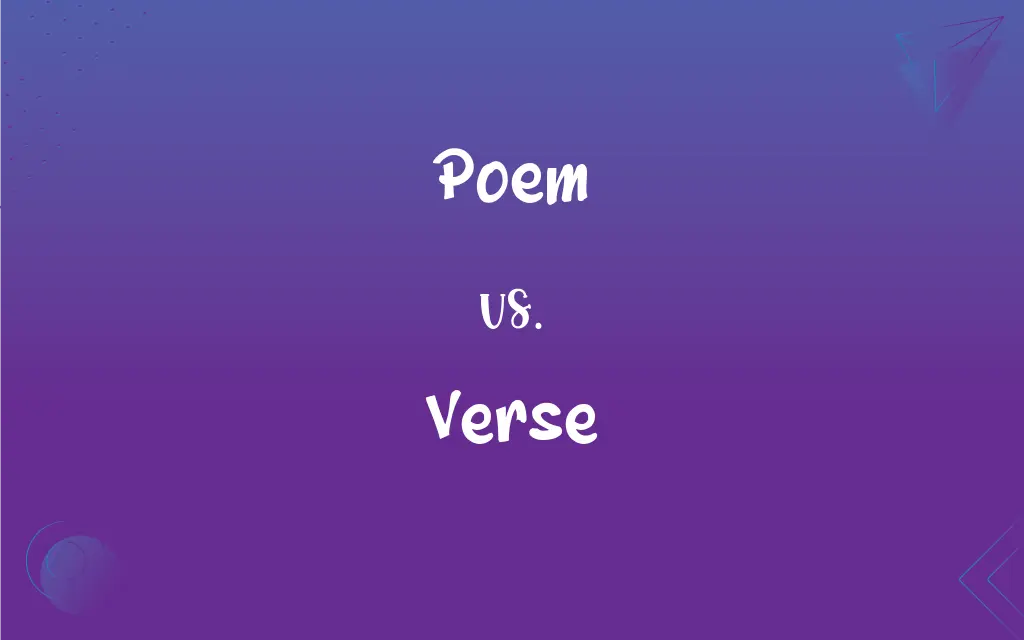Poem vs. Verse: What's the Difference?
Edited by Aimie Carlson || By Janet White || Published on December 1, 2023
Poem refers to a work of literature expressing ideas with a distinctive style and rhythm. Verse refers to a single line of poetry or a subdivision of a poem, often with a specific rhyme or rhythm.

Key Differences
A poem is a collection of words that express an idea or emotion in a style that is often rhythmic and metaphorical. A verse, on the other hand, refers to a single line of a poem or a specific subdivision within a poem, characterized by a particular length, rhythm, or rhyme scheme.
While a poem is a complete work in itself, conveying a central theme or emotion, a verse is a component of a poem or song. Each verse in a poem can carry its own sub-theme or contribute to the overall narrative of the poem.
The structure of a poem is often defined by its verses, which can vary in length and pattern, but a single verse does not constitute a complete poem. Poems can be made up of multiple verses that together create a cohesive whole.
In terms of composition, a poem is a broader concept that can encompass various forms, such as sonnets or haikus, while a verse is a more specific element within these forms. Verses are the building blocks that come together to form the structure of a poem.
The term 'poem' usually signifies a work intended for literary appreciation, often with deep emotional or philosophical undertones, whereas 'verse' can refer to a more straightforward, functional set of lines within a poem or song.
ADVERTISEMENT
Comparison Chart
Definition
A composed work of art using language aesthetically
A single line or subdivision of a poem
Structure
Can consist of multiple verses and stanzas
A part of a poem's structure
Standalone Ability
Can stand alone as a complete artistic work
Typically does not stand alone
Purpose
To convey a thematic, emotional, or aesthetic idea
To build upon or contribute to the poem's theme
Variability
Varies in form, style, and length
Consistent in pattern within a specific poem
ADVERTISEMENT
Poem and Verse Definitions
Poem
A piece of writing that partakes of the nature of both speech and song.
The Raven by Edgar Allan Poe is a hauntingly beautiful poem.
Verse
A single line of poetry.
The verse Once upon a midnight dreary is instantly recognizable.
Poem
A literary work that uses conciseness and musicality to enhance its meaning.
His poem used simple words but conveyed deep emotions.
Verse
A subdivision of a poem or song, often sharing a consistent rhythm.
The second verse of the song added more depth to the story.
Poem
A creative composition, often using rhyme and meter.
Her first poem was a short piece about childhood memories.
Verse
A part of a stanza with a set metrical pattern.
The final verse of the stanza brought the point home poignantly.
Poem
An arrangement of words that express feelings and thoughts in a special way.
Her poem about the seasons beautifully captures the essence of change.
Verse
A poetic line or stanza.
The first verse set the tone for the entire poem.
Poem
A written piece that uses rhythm and imagery to evoke emotions.
The poem about the ocean made me feel like I was right there by the shore.
Verse
A segment of a poem, distinguished by number, meter, or rhyme.
Each verse in the poem offered a new perspective on the subject.
Poem
A verbal composition designed to convey experiences, ideas, or emotions in a vivid and imaginative way, characterized by the use of language chosen for its sound and suggestive power and by the use of literary techniques such as meter, metaphor, and rhyme.
Verse
A single metrical line in a poetic composition; one line of poetry.
Poem
A composition in verse rather than in prose
Wrote both prose and poems.
Verse
A division of a metrical composition, such as a stanza of a poem or hymn.
Poem
A literary composition written with an intensity or beauty of language more characteristic of poetry than of prose.
Poem
A literary piece written in verse.
Poem
A piece of writing in the tradition of poetry, an instance of poetry.
Poem
A piece of poetic writing, that is with an intensity or depth of expression or inspiration greater than is usual in prose.
Poem
A metrical composition; a composition in verse written in certain measures, whether in blank verse or in rhyme, and characterized by imagination and poetic diction; - contradistinguished from prose; as, the poems of Homer or of Milton.
Poem
A composition, not in verse, of which the language is highly imaginative or impassioned; as, a prose poem; the poems of Ossian.
Poem
A composition written in metrical feet forming rhythmical lines
FAQs
How long is a typical poem?
The length of a poem can vary greatly, from just a few lines to several pages.
Do all poems rhyme?
Not all poems rhyme; many modern poems use free verse without rhyme.
What are the different types of poems?
There are various types, including sonnets, haikus, free verse, and limericks.
What is a poem?
A poem is a literary work that expresses feelings, thoughts, or ideas in a distinctive style and rhythm.
How do you analyze a poem?
Analysis involves examining the language, structure, rhythm, and themes.
Are poems always written in verse?
Most poems are written in verse, but some use prose.
Can a poem tell a story?
Yes, narrative poems specifically tell a story.
What is the purpose of a poem?
Poems aim to evoke emotions, convey ideas, or express artistic beauty.
Can poems be non-fiction?
Yes, poems can be based on real events or experiences.
How do you identify a verse?
A verse is identified by its placement in a stanza and its metrical pattern.
What is blank verse?
Blank verse is unrhymed verse, typically in iambic pentameter.
What makes a good poem?
Good poems often have emotional depth, artistic expression, and thoughtful structure.
What is a verse in poetry?
A verse is a single line in a poem or a subdivision of a poem with a specific rhythm.
Can verse be found outside of poetry?
Yes, verse is also used in song lyrics and some prose writings.
How does verse impact a poem's rhythm?
The structure of verses contributes significantly to the overall rhythm of a poem.
Can a poem have only one verse?
Typically, a poem consists of multiple verses, but exceptionally short poems might have only one.
Does verse need to rhyme?
Verse does not necessarily need to rhyme; it depends on the poem's form.
Are all verses in a poem the same length?
Not necessarily; verse length can vary within a poem.
How is verse different from a stanza?
A stanza is a grouped set of verses in a poem.
What is free verse?
Free verse is poetry without a fixed meter or rhyme scheme.
About Author
Written by
Janet WhiteJanet White has been an esteemed writer and blogger for Difference Wiki. Holding a Master's degree in Science and Medical Journalism from the prestigious Boston University, she has consistently demonstrated her expertise and passion for her field. When she's not immersed in her work, Janet relishes her time exercising, delving into a good book, and cherishing moments with friends and family.
Edited by
Aimie CarlsonAimie Carlson, holding a master's degree in English literature, is a fervent English language enthusiast. She lends her writing talents to Difference Wiki, a prominent website that specializes in comparisons, offering readers insightful analyses that both captivate and inform.






































































